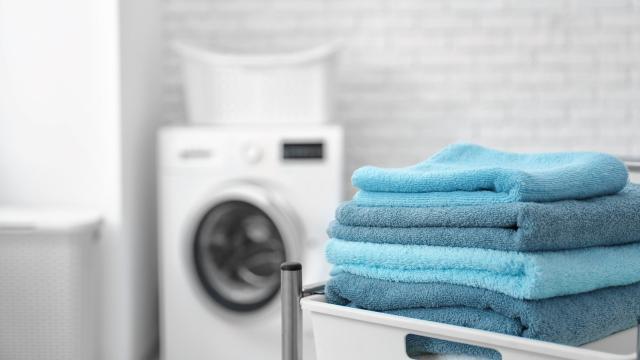Um, I’m sorry. Did I just read that we lose approximately 30,000 to 40,000 dead skin cells every minute? Totalling about nine pounds (4kg) of dead skin cells a year? Much to my dismay, yes. And where, pray tell, do these dead skin cells land after I take a gloriously scorching shower? On my towel of course.
That’s not all. Those skin cells, when combined with moisture, create the perfect living environment for microbes like viruses, fungi, and bacteria. Not only will your towels start to stink, excessive microorganisms can increase the spread of rashes like athlete’s foot and impetigo, aggravate eczema and acne, and potentially increase the likelihood of contracting a staph infection. Also? If they remain damp and unwashed long enough, they can grow mould. Mould, I tell you.
If you’re already on the “wash after every each use” train, you’re not in bad shape. If you’ve been known to finish all the week’s laundry only to later realise Crap, I forgot the towels! well, we have some news.
How often should bath towels be washed?
Most experts, including The Cleaning Institute, recommend washing your towels after every three to five uses to get those microscopic critters off (or at the first sign of smell, because that’s a strong indication the colonies are multiplying). We hope this goes without saying, but gym towels that contain sweat (and a way too-intimate knowledge of the inside of your gym bag) need to be washed after each use. Same goes for any towels tainted with body fluids, or those that don’t get completely dry between uses. (It’s best to let your towels air dry before tossing them in the laundry hamper to prevent further funk growing on them.)
Wash towels on the hottest heat setting (preferably at least 60 degrees Celsius) and tumble dry on high.
Can you wash your towels with your clothes?
Listen, you’re an adult. You can do whatever you want. But remember all those grody germs and bacteria growing like crazy on your towels? They can transfer to your clothes in the wash. For sanitary reasons, your best bet is to keep them separate in the wash. (Also, towels are notorious lint generators — another reason to keep them away from your clothes). And when it comes time to dry, those terrycloth towels will increase your clothes drying time unnecessarily.
Should you wash towels with sheets?
Negative, again. Again, no one will die if you do, but here’s why it’s not the best idea: First, towels are made of much heavier, thicker, sturdier fabric, while sheets are typically made of thin cotton or cotton/polyester blends. Not only will they require different wash and dry times (towels can take up to twice as long to dry), towels tend to get swallowed up into the corners of fitted sheets, hindering how thoroughly they are washed and pretty much ensuring they’ll stay damp.
Can you wash bath towels with kitchen towels?
Can you guess what I’m going to say here? Unfortunately it is no. Your kitchen washcloths and dish towels touch all manner of nastiness every day. Dirty counters, raw meat juices, the floor, people’s mouths — just to name a few. (If you’ve got kids, honestly, it’s anybody’s guess what disgusting journeys those towels have been on any given day.) Researchers have found E. coli and Staphylococcus aureus lurking on kitchen towels, which can cause food poisoning and other food-borne illnesses — not the kind of stuff you want mingling with the fabric tendrils you use to dry your face.
So, for peak hygiene, it’s recommended to wash bath towels after every 3-5 uses and keep them separate from your clothes, sheets, and kitchen towels in the wash. Is this annoying? Hell yes. Do I want towels that have graced my husband’s undercarriage mixing with my tea towels? Probs not.
(P.S. Microfiber towels are a whole other ball of wax you can read about here.)

Leave a Reply
You must be logged in to post a comment.